外研版英语必修二Module 3 Music grammar课件(共36张PPT)
文档属性
| 名称 | 外研版英语必修二Module 3 Music grammar课件(共36张PPT) |
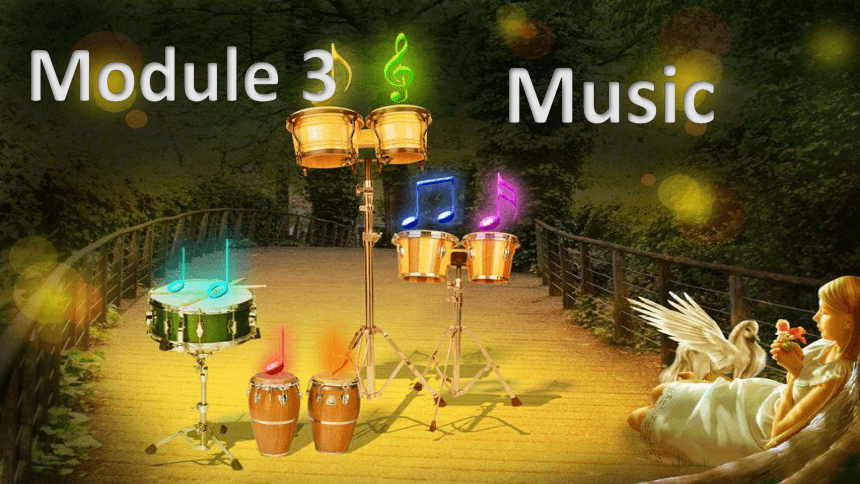
|
|
| 格式 | rar | ||
| 文件大小 | 3.4MB | ||
| 资源类型 | 教案 | ||
| 版本资源 | 外研版 | ||
| 科目 | 英语 | ||
| 更新时间 | 2019-12-10 00:00:00 | ||
图片预览

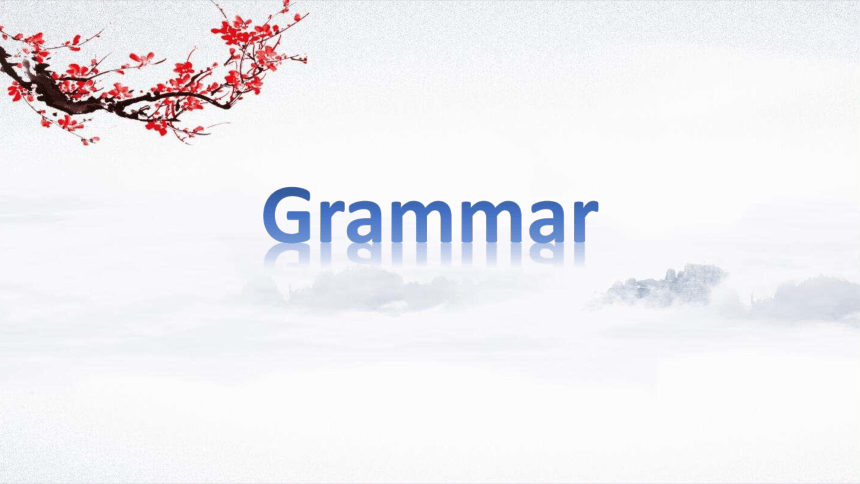
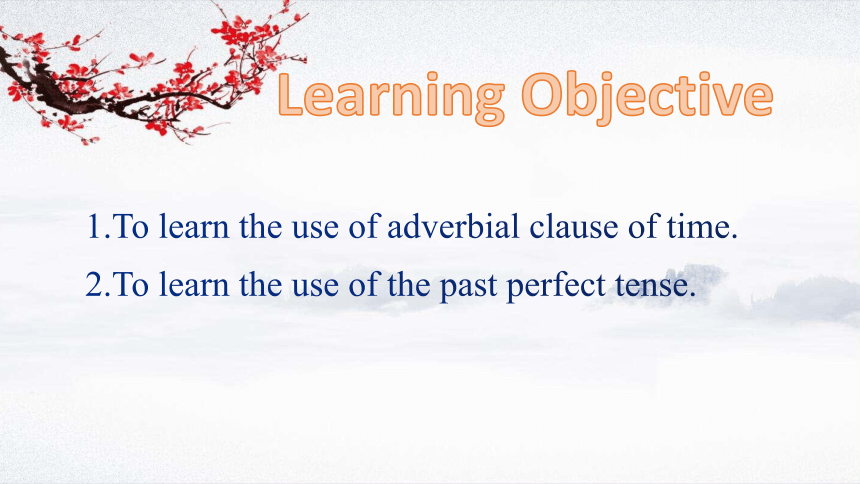
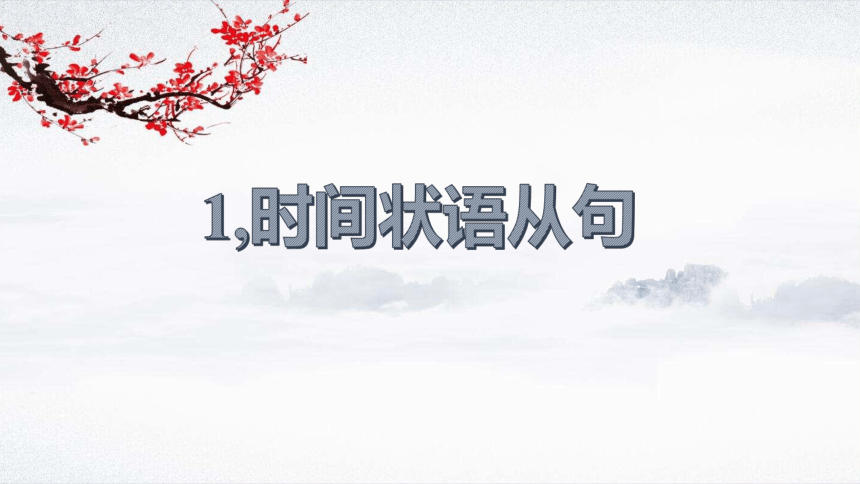

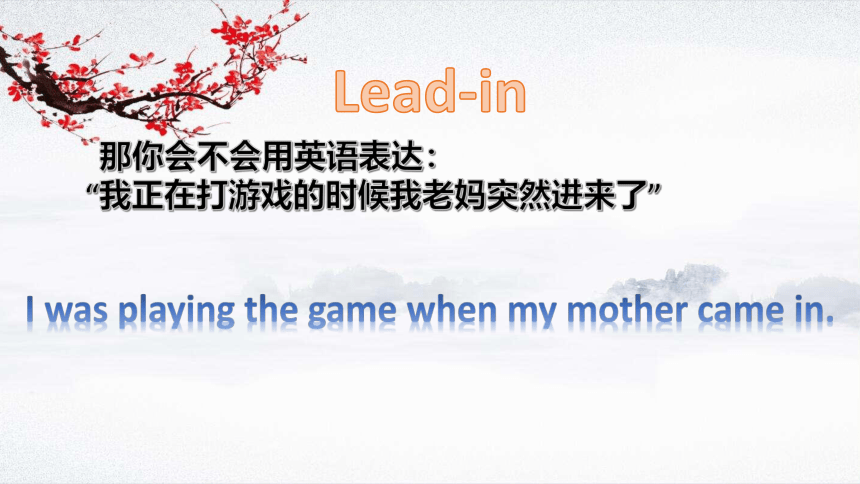


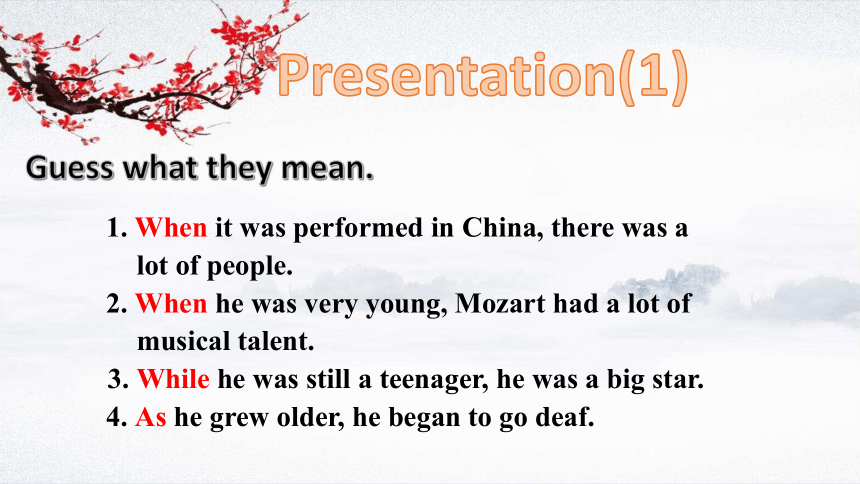
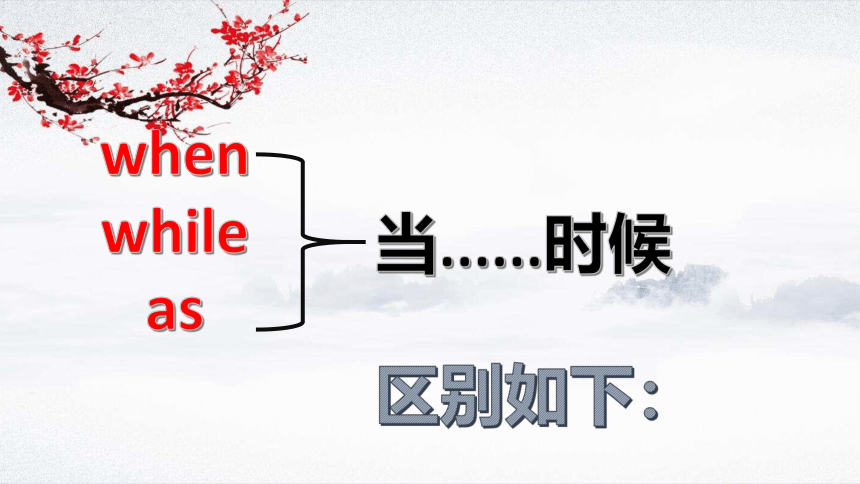
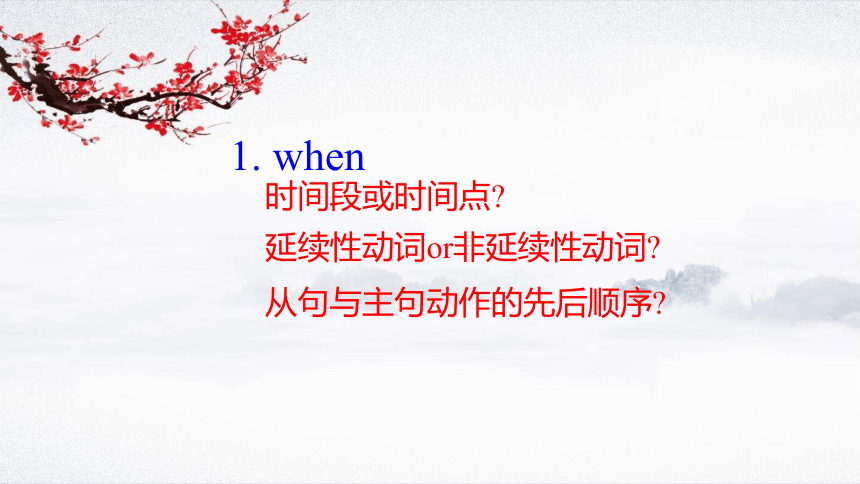
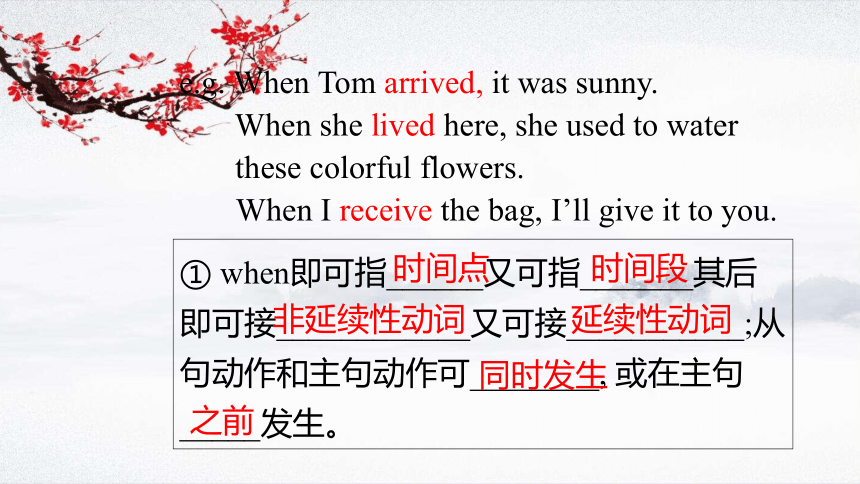
文档简介
(共36张PPT)
Module 3
Music
Grammar
Learning Objective
1.To learn the use of adverbial clause of time.
2.To learn the use of the past perfect tense.
1,时间状语从句
Warming-up
你有没有遇到一种情况,
当你在打游戏的时候你妈妈突然闯进来了?
Lead-in
那你会不会用英语表达:
“我正在打游戏的时候我老妈突然进来了”
I was playing the game when my mother came in.
When : 当......时候......;
用来引导时间状语从句。
用表示时间的连词连接一个句子作状语,这样的主从复合句就是时间状语从句。
连接时间状语从句的连接词有:when, before, after, while, as soon as, until, since......
这里要注意一点的是,如果主句是一般将来时,从句只能用一般现在时表示将来意义。
e.g. I will go for a visit Beijing when my friends come.
定义:
Presentation(1)
Guess what they mean.
1. When it was performed in China, there was a lot of people.
2. When he was very young, Mozart had a lot of musical talent.
3. While he was still a teenager, he was a big star.
4. As he grew older, he began to go deaf.
when
while
as
当......时候
区别如下:
1. when
时间段或时间点?
延续性动词or非延续性动词?
从句与主句动作的先后顺序?
① when即可指______又可指_______其后即可接____________又可接___________;从句动作和主句动作可________, 或在主句_____发生。
时间段
时间点
延续性动词
非延续性动词
同时发生
之前
e.g. When Tom arrived, it was sunny.
When she lived here, she used to water
these colorful flowers.
When I receive the bag, I’ll give it to you.
⑴ be doing sth. when……
某人正在做 ……突然 ……
⑵
某人正要做 ……突然 ……
⑶ Sb. had just done sth. when……
某人刚刚干了……这时……
② when也常用于下列句型:
be on the point of doing sth.When…
be about to do sth. when…
e.g. 1.We were running on the stadium
when the rain started.
2.My boss was about to leave when the smart phone rang.
3.The student had just made the mistake when the English teacher came in.
2. while
时间段或时间点?
延续性动词or非延续性动词?
从句与主句动作的先后顺序?
e.g. 1.While they were watching TV ,
someone broke into the room.
2. While he was still a child, he can play guitar very well.
① while即指的是_______; 其后只可接__________; 从句和主句动作______发生。
时间段
延续性动词
同时
② while还可作并列连词,意为“而,然而”
e.g. I like eating sugars while he likes
eating fruits.
③ while还可引导让步状语从句, 意为“虽
然,尽管”。
e.g. While he is a good student, he still likes smoking
④ When/while引导时间状语从句,如
果主从句主语相同,且从句含有be
动词,则从句中可以省略主语和be
动词。
e.g. When/While he was playing in the street, he
met his friend.
When/while playing in the street, he met his friend.
Playing in the street, he met his friend.
强调两个动作同时进行
两种情况一起发展变化
试观察:
1) As they were laughing, the girls were crying.
2) As he grew older, he found it difficult to compose good music.
3. as
【注释】
as引导的从句表示“当……时;一 边……一边……”,
主句和从句的动作同时发生,强调伴随。有时可译为“随着”。
【拓展】
as还有表:“因为”;“作为”;“像”。
e.g. 1.As my leg was broken,I was late for school.
2.We choosed Tom as our monitor.
3.He acts as he can do it.
Practice
Traslation:
1) 他敲门的时候,他妈妈正忙于洗衣服。
2) 他一边唱歌一边跳舞。
3) 我们正要出发,这时暴雨突然来临。
4) 你喜欢看书而我喜欢运动。
5) 随着时间的推移,我们都学会了很多。
Possible answers:
1) When he knocked on the door, his mother was busy in washing.
2) As he sang, he danced.
3) We were about to set off when the storm started.
4) You like reading while I like
doing sports.
5) As time went by, we all learnt a lot.
2.过去完成时
Warming-up
你有没有一种情况,就是问你做完某件事情了没?
然后你通常回答是,我早就做完了或者说
我昨天之前就做完了
Lead-in
我昨天就做完作业了
Traslation:
I had finished my homework yesterday.
定义:
过去完成时(The Past Perfect Tense):
表示过去某一时间或动作以前已经发生或完成了的动作,对过去的某一点造成的某种影响或是结果,
用来指在另一个过去行动之前就已经完成了的事件。在英语时态中,“时“指动作发生的时间,
”态“指动作的样子和状态。 它表示动作发生的时间是“过去的过去”,侧重事情的结果。
present
past 1
past 2
had done
present
toured the United States
had become stars
past 1
past 2
past perfect tense
past simple tense
1. After they had become famous in their own
country, the band toured around China.
Practice 1
6:00 (eat up) 7:00 (get up) present
Last Sunday, I had an unlucky day.
By the time I _______, my mum ________ all my dirty clothes.
got up
had washed
After the studying abroad, I went to meet a friend whom
I ___________ (not see) since we _________.
had not seen
graduate
not see
graduated
过去完成时与一般过去时的区别
过去完成时:在时间上强调“过去的过去”
一般过去时:只强调过去某一特定的时间
1.My brother had arrived home by ten yesterday.
我的弟弟昨天10点之前到家。
(“到家”发生在昨天10点之前。)
2.My brother arrived home at ten yesterday.
他们昨天10点到家。
In the 1950s in the USA, most families had just one phone at home, and wireless phones _________________ (invent) yet.
(2017 北京)
hadn’t been invented
高考链接
1.复习时间状语从句。
Adverbial clause of time
2.复习过去完成时。
The past perfect tense
总结
1. Review Grammar.
2. Finish the exercises 3 and 4 on page 27.
Homework
Thank you
Module 3
Music
Grammar
Learning Objective
1.To learn the use of adverbial clause of time.
2.To learn the use of the past perfect tense.
1,时间状语从句
Warming-up
你有没有遇到一种情况,
当你在打游戏的时候你妈妈突然闯进来了?
Lead-in
那你会不会用英语表达:
“我正在打游戏的时候我老妈突然进来了”
I was playing the game when my mother came in.
When : 当......时候......;
用来引导时间状语从句。
用表示时间的连词连接一个句子作状语,这样的主从复合句就是时间状语从句。
连接时间状语从句的连接词有:when, before, after, while, as soon as, until, since......
这里要注意一点的是,如果主句是一般将来时,从句只能用一般现在时表示将来意义。
e.g. I will go for a visit Beijing when my friends come.
定义:
Presentation(1)
Guess what they mean.
1. When it was performed in China, there was a lot of people.
2. When he was very young, Mozart had a lot of musical talent.
3. While he was still a teenager, he was a big star.
4. As he grew older, he began to go deaf.
when
while
as
当......时候
区别如下:
1. when
时间段或时间点?
延续性动词or非延续性动词?
从句与主句动作的先后顺序?
① when即可指______又可指_______其后即可接____________又可接___________;从句动作和主句动作可________, 或在主句_____发生。
时间段
时间点
延续性动词
非延续性动词
同时发生
之前
e.g. When Tom arrived, it was sunny.
When she lived here, she used to water
these colorful flowers.
When I receive the bag, I’ll give it to you.
⑴ be doing sth. when……
某人正在做 ……突然 ……
⑵
某人正要做 ……突然 ……
⑶ Sb. had just done sth. when……
某人刚刚干了……这时……
② when也常用于下列句型:
be on the point of doing sth.When…
be about to do sth. when…
e.g. 1.We were running on the stadium
when the rain started.
2.My boss was about to leave when the smart phone rang.
3.The student had just made the mistake when the English teacher came in.
2. while
时间段或时间点?
延续性动词or非延续性动词?
从句与主句动作的先后顺序?
e.g. 1.While they were watching TV ,
someone broke into the room.
2. While he was still a child, he can play guitar very well.
① while即指的是_______; 其后只可接__________; 从句和主句动作______发生。
时间段
延续性动词
同时
② while还可作并列连词,意为“而,然而”
e.g. I like eating sugars while he likes
eating fruits.
③ while还可引导让步状语从句, 意为“虽
然,尽管”。
e.g. While he is a good student, he still likes smoking
④ When/while引导时间状语从句,如
果主从句主语相同,且从句含有be
动词,则从句中可以省略主语和be
动词。
e.g. When/While he was playing in the street, he
met his friend.
When/while playing in the street, he met his friend.
Playing in the street, he met his friend.
强调两个动作同时进行
两种情况一起发展变化
试观察:
1) As they were laughing, the girls were crying.
2) As he grew older, he found it difficult to compose good music.
3. as
【注释】
as引导的从句表示“当……时;一 边……一边……”,
主句和从句的动作同时发生,强调伴随。有时可译为“随着”。
【拓展】
as还有表:“因为”;“作为”;“像”。
e.g. 1.As my leg was broken,I was late for school.
2.We choosed Tom as our monitor.
3.He acts as he can do it.
Practice
Traslation:
1) 他敲门的时候,他妈妈正忙于洗衣服。
2) 他一边唱歌一边跳舞。
3) 我们正要出发,这时暴雨突然来临。
4) 你喜欢看书而我喜欢运动。
5) 随着时间的推移,我们都学会了很多。
Possible answers:
1) When he knocked on the door, his mother was busy in washing.
2) As he sang, he danced.
3) We were about to set off when the storm started.
4) You like reading while I like
doing sports.
5) As time went by, we all learnt a lot.
2.过去完成时
Warming-up
你有没有一种情况,就是问你做完某件事情了没?
然后你通常回答是,我早就做完了或者说
我昨天之前就做完了
Lead-in
我昨天就做完作业了
Traslation:
I had finished my homework yesterday.
定义:
过去完成时(The Past Perfect Tense):
表示过去某一时间或动作以前已经发生或完成了的动作,对过去的某一点造成的某种影响或是结果,
用来指在另一个过去行动之前就已经完成了的事件。在英语时态中,“时“指动作发生的时间,
”态“指动作的样子和状态。 它表示动作发生的时间是“过去的过去”,侧重事情的结果。
present
past 1
past 2
had done
present
toured the United States
had become stars
past 1
past 2
past perfect tense
past simple tense
1. After they had become famous in their own
country, the band toured around China.
Practice 1
6:00 (eat up) 7:00 (get up) present
Last Sunday, I had an unlucky day.
By the time I _______, my mum ________ all my dirty clothes.
got up
had washed
After the studying abroad, I went to meet a friend whom
I ___________ (not see) since we _________.
had not seen
graduate
not see
graduated
过去完成时与一般过去时的区别
过去完成时:在时间上强调“过去的过去”
一般过去时:只强调过去某一特定的时间
1.My brother had arrived home by ten yesterday.
我的弟弟昨天10点之前到家。
(“到家”发生在昨天10点之前。)
2.My brother arrived home at ten yesterday.
他们昨天10点到家。
In the 1950s in the USA, most families had just one phone at home, and wireless phones _________________ (invent) yet.
(2017 北京)
hadn’t been invented
高考链接
1.复习时间状语从句。
Adverbial clause of time
2.复习过去完成时。
The past perfect tense
总结
1. Review Grammar.
2. Finish the exercises 3 and 4 on page 27.
Homework
Thank you
